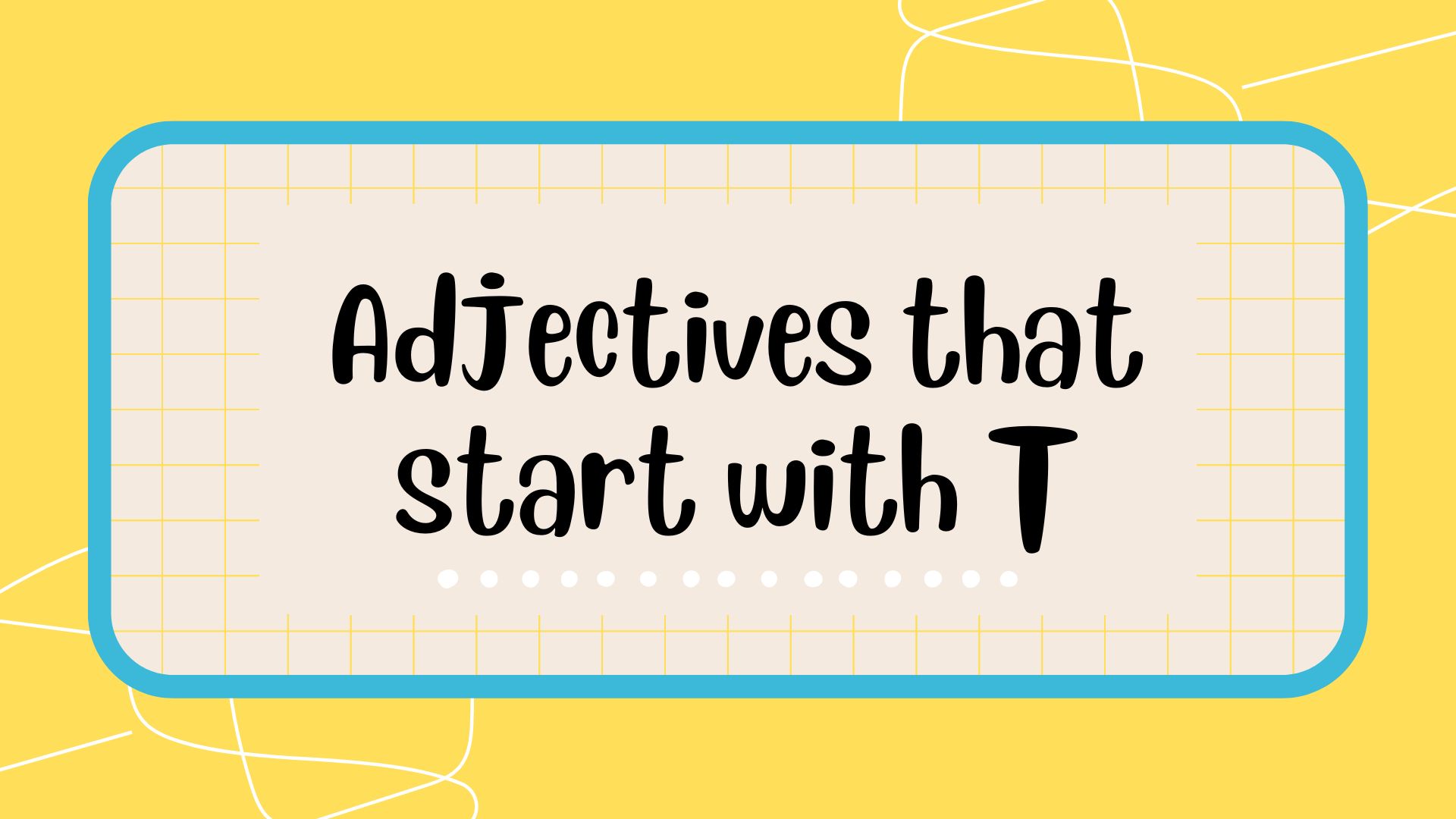Language is a powerful tool—shaping the way we express ideas, describe the world, and connect with others. Whether you’re writing a compelling story, delivering a persuasive speech, or simply spicing up everyday conversation, the right adjectives can make all the difference. In this article, we’re diving into 25 adjectives that start with the letter T—each one packed with personality and purpose. From traits that describe people to terms that paint vivid images, these words can help you communicate with greater clarity, creativity, and confidence.
What Is Meant by Adjective?
An adjective is a word that adds detail or description to a noun, helping us understand more about the person, place, thing, or idea being mentioned. It answers questions like What kind?, How many?, Which one?, or Whose?. For example, in the phrase “a cold drink,” the adjective cold describes the noun drink, telling us more about its temperature. Adjectives can describe qualities like color (blue car), size (tall building), emotion (happy child), or quantity (three apples). By using adjectives, we can make our communication clearer, more vivid, and more engaging.
Let’s explore these T-powered descriptors and discover how to incorporate them into your writing and conversations.
Describing Personality Traits
Words can bring character to life. When you’re trying to describe someone’s personality, choosing the right adjective is key. Here are Adjectives starting with T that reflect personal attributes—both admirable and challenging.
- Trustworthy – Reliable and dependable; someone you can count on.
- Tactful – Skilled in handling sensitive matters without offending others.
- Tenacious – Persistent and determined, even in the face of obstacles.
- Thoughtful – Considerate and caring; someone who thinks of others.
- Timid – Shy or lacking in confidence; reserved in nature.
- Tolerant – Open-minded and accepting of different opinions or behaviors.
- Temperamental – Moody or prone to emotional fluctuations.
- Tidy – Neat and well-organized; someone who keeps things in order.
Example:
“Her tactful approach to conflict made her an excellent team leader, especially during high-stress meetings.”
Describing Appearance or Physical Qualities
When painting a picture of a person, place, or object, appearance-based adjectives bring your descriptions to life.
- Tall – Greater in height than average.
- Tanned – Having a darker skin tone from sun exposure.
- Trim – Neatly shaped or in good physical condition.
- Torn – Ripped or damaged by pulling or wear.
- Transparent – See-through, often used literally or metaphorically.
- Textured – Having a surface that is not smooth; rich in detail or complexity.
Example:
“He wore a torn jacket and a tanned complexion that told stories of summer adventures.”
Describing Emotions or Mental States
These adjectives help articulate what people feel or think, giving depth to dialogue or narratives.
- Thrilled – Extremely happy or excited.
- Troubled – Worried or mentally burdened.
- Tense – Feeling nervous or strained.
- Tranquil – Calm, peaceful, and free from disturbance.
- Thankful – Feeling gratitude or appreciation.
Example:
“Despite the chaos around her, she remained tranquil, her focus unshaken.”
Describing Actions or Behavior
Sometimes, you need to describe how someone behaves or acts. These T adjectives offer insight into a person’s approach or manner.
- Tireless – Working hard without stopping; showing great effort.
- Timely – Happening at just the right moment.
- Talkative – Fond of talking; chatty.
- Tactless – Lacking sensitivity in dealing with others; blunt.
- Thorough – Complete and detailed in every aspect.
Example:
“His thorough preparation gave him the edge in the interview process.”
Why Vocabulary Variety Matters
The ability to choose the right adjective not only enhances your communication but also helps avoid repetitive or bland language. Imagine describing every person as “nice” or every situation as “good”—not exactly engaging, right? With words like tenacious, tactful, or thrilled, your descriptions become sharper, more memorable, and more precise.
In both professional and casual contexts, the right word at the right time can shape how your message is received. A rich vocabulary reflects not just intelligence, but empathy, creativity, and attention to detail.
For More Queries Explore: Verbomize.com to expanding your Knowledge.
Final Thoughts: Take Your Word Power Further
Now that you’re familiar with 25 terrific adjectives starting with T, challenge yourself to use a few in your next email, story, or conversation. Start paying attention to the words people use around you—what do they reveal? How might you add more texture or tone to your own descriptions?
Key takeaways:
- Adjectives add color, clarity, and emotion to your communication.
- “T” adjectives cover a wide range of meanings, from temperament to texture.
- Expanding your vocabulary makes your writing more engaging and precise.
